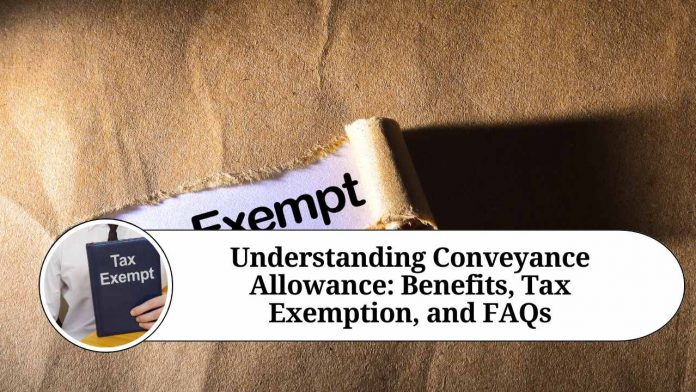Conveyance allowance is a benefit that employers offer to their employees to cover their transportation expenses while commuting to work. The allowance is usually a fixed amount of money paid to the employee each month, and it can be claimed as a tax exemption under certain conditions.
What is the purpose of Conveyance Allowance?
The purpose of the conveyance allowance is to ease the financial burden on employees who have to commute to work every day. This allowance can be used to cover expenses such as fuel, public transport fares, and even vehicle maintenance costs.
Conveyance allowance is not mandatory for employers to offer to their employees, but it is a popular benefit in many organizations. The amount of conveyance allowance offered can vary from company to company and also depend on the level of the employee’s position and the distance they need to travel to get to work.
How to Claim a Conveyance Allowance?
To claim a tax exemption on the conveyance allowance, there are certain conditions that need to be met. Firstly, the allowance must be a part of the employee’s salary package, and the amount must be fixed and not variable. Secondly, the conveyance allowance should only be used to cover the actual transportation expenses incurred by the employee while commuting to work.
In case the conveyance allowance amount exceeds the actual transportation expenses incurred by the employee, the excess amount is taxable as per income tax laws. Similarly, if the employee uses the conveyance allowance for any other purpose other than transportation expenses, the amount is also taxable.
It is important to note that conveyance allowance is different from travel allowance, which is given to employees when they travel for business purposes. The travel allowance is taxable, and the tax liability can be reduced by submitting bills and other documents to prove that the allowance was used for business travel.
Benefits Of Conveyance Allowance
Conveyance allowance is not only a beneficial benefit for employees but can also be advantageous for employers. By offering this benefit, employers can attract and retain talented employees who may be looking for a company that provides support in their daily transportation expenses. Additionally, offering a conveyance allowance can also boost employee morale and productivity, as it helps reduce the stress and financial burden of commuting to work.
Employers can also benefit from the tax exemption associated with the conveyance allowance. By providing this benefit, employers can reduce their tax liability as the allowance is deductible as an expense. Therefore, it is a win-win situation for both employers and employees.
It is important to note that conveyance allowance is not the only option available to employers. They can also consider other modes of transportation benefits such as providing company-owned transportation, subsidies for carpooling, or providing a shuttle service for employees.
Final Conclusion
In conclusion, conveyance allowance is an essential benefit that can make a difference in the lives of employees who have to commute to work every day. It can help reduce the financial burden on employees, boost morale and productivity, and also provide tax benefits to employers. As such, employers should consider offering this benefit to their employees to enhance their workplace culture and show their commitment to supporting their employees’ overall well-being.
Other Related Blogs: Section 144B Income Tax Act
Here are some frequently asked questions (FAQs) about conveyance allowance:
Q.What is a conveyance allowance?
A conveyance allowance is a fixed amount of money paid by an employer to an employee to cover their transportation expenses while commuting to work.
Q.Is a conveyance allowance mandatory for employers to provide?
No, it is not mandatory for employers to provide a conveyance allowance. It is an optional benefit that employers may offer to their employees.
Q.Can an employee claim tax exemption on conveyance allowance?
Yes, an employee can claim tax exemption on conveyance allowance under certain conditions. The allowance must be a part of the employee’s salary package, and the amount must be fixed and not variable. Additionally, the conveyance allowance should only be used to cover the actual transportation expenses incurred by the employee while commuting to work.
Q.Can an employee use the conveyance allowance for purposes other than transportation expenses?
No, the conveyance allowance should only be used to cover the actual transportation expenses incurred by the employee while commuting to work. If an employee uses the allowance for any other purpose, the excess amount is taxable.
Q.Is the conveyance allowance the same as a travel allowance?
No, conveyance allowance and travel allowance are two different benefits. A conveyance allowance is paid to an employee to cover their daily transportation expenses while commuting to work. Travel allowance is given to employees when they travel for business purposes and is taxable.
Q.Can employers offer other transportation benefits to their employees besides conveyance allowance?
Yes, employers can offer other transportation benefits to their employees, such as providing company-owned transportation, subsidies for carpooling, or providing a shuttle service for employees.
Q.Can an employee receive both conveyance allowance and travel allowance?
Yes, an employee can receive both conveyance allowance and travel allowance if they are eligible and if the expenses claimed for each benefit are separate and distinct.




















